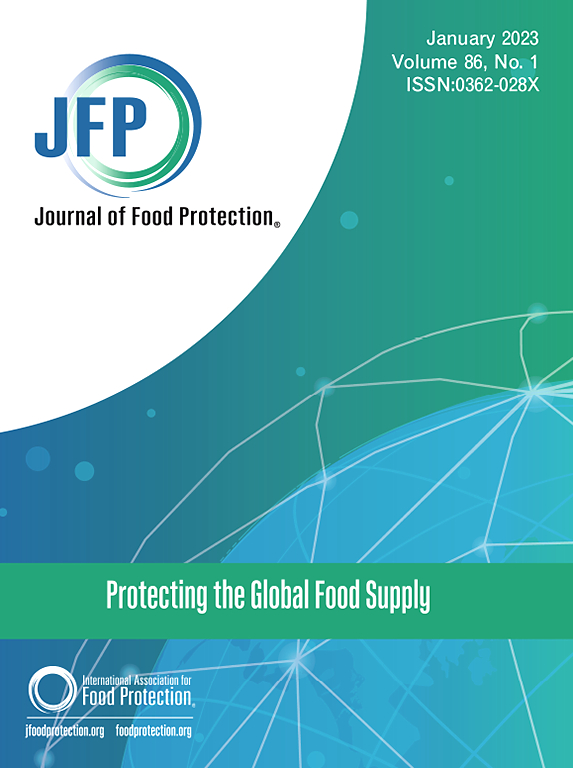Microbiological Quality of Plant-based Meat-alternative Products Collected at Retail Level in Switzerland
IF 2.1
4区 农林科学
Q3 BIOTECHNOLOGY & APPLIED MICROBIOLOGY
引用次数: 0
Abstract
As the interest in plant-based alternative food products has increased significantly in the last years, it is also important to investigate these products regarding microbiological aspects. The aim of this study was to assess the microbiological quality and the occurrence of selected foodborne pathogens in plant-based meat alternative products (PBMA) collected at retail level in Switzerland. A total of 100 PBMA (84 vegan and 16 vegetarian products) was analyzed qualitatively for the presence of Salmonella, Listeria monocytogenes and quantitatively for Staphylococcus aureus, Bacillus cereus group members, Enterobacteriaceae, and the total viable count. Furthermore, pH measurements were carried out and the aw-value was determined. Isolates were further analyzed with Whole Genome Sequencing. The total viable count before the expiration date was between <2 log and 7 log CFU/g (median: 5.97 log CFU/g). In six (6%) samples, Enterobacteriaceae with 2 log to 3 log CFU/g were detected. No Salmonella and no Listeria monocytogenes were detected. However, seven products (7%) were contaminated with other Listeria spp. (six L. innocua and one L. seeligeri). Further findings were two (2%) Staphylococcus aureus ST8 with the presence of selx and tsst-1 genes, and five (5%) Bacillus cereus group members (three B. paranthracis, one B. cereus sensu stricto, and one B. cytotoxicus) which all were diarrhea-associated strains.
This study provides data that are relevant for HACCP concepts of companies that produce plant-based meat alternative products and helps to define microbiological parameters that should be included when testing such products.
瑞士在零售层面收集的植物肉替代产品的微生物质量。
近年来,人们对植物替代食品的兴趣明显增加,因此对这些产品进行微生物方面的调查也很重要。这项研究的目的是评估在瑞士零售收集的植物性肉类替代产品(PBMA)的微生物质量和特定食源性病原体的发生率。共对 100 种植物性肉类替代品(84 种素食产品和 16 种素食产品)进行了定性分析,以确定是否存在沙门氏菌和李斯特菌,并定量分析了金黄色葡萄球菌、蜡样芽孢杆菌属、肠杆菌科和总存活数。此外,还进行了 pH 值测量和 aw 值测定。对分离物进行了全基因组测序分析。有效期前的总存活数介于 < 2 log 和 7 log CFU/g 之间(中位数:5.97 log CFU/g)。在六个(6%)样品中检测到了 2 至 3 log CFU/g 的肠杆菌。没有检测到沙门氏菌和李斯特菌。不过,有 7 个产品(7%)受到其他李斯特菌属的污染(6 个无毒李斯特菌属和 1 个海氏李斯特菌属)。此外,还发现 2 株(2%)金黄色葡萄球菌 ST8(含有 selx 和 tsst-1 基因)和 5 株(5%)蜡样芽孢杆菌(3 株副蜡样芽孢杆菌、1 株狭义蜡样芽孢杆菌和 1 株细胞毒性蜡样芽孢杆菌),它们都是与腹泻有关的菌株。这项研究提供的数据与生产植物性肉类替代产品的公司的 HACCP 概念相关,并有助于确定检测此类产品时应包括的微生物参数。
本文章由计算机程序翻译,如有差异,请以英文原文为准。
求助全文
约1分钟内获得全文
求助全文
来源期刊

Journal of food protection
工程技术-生物工程与应用微生物
CiteScore
4.20
自引率
5.00%
发文量
296
审稿时长
2.5 months
期刊介绍:
The Journal of Food Protection® (JFP) is an international, monthly scientific journal in the English language published by the International Association for Food Protection (IAFP). JFP publishes research and review articles on all aspects of food protection and safety. Major emphases of JFP are placed on studies dealing with:
Tracking, detecting (including traditional, molecular, and real-time), inactivating, and controlling food-related hazards, including microorganisms (including antibiotic resistance), microbial (mycotoxins, seafood toxins) and non-microbial toxins (heavy metals, pesticides, veterinary drug residues, migrants from food packaging, and processing contaminants), allergens and pests (insects, rodents) in human food, pet food and animal feed throughout the food chain;
Microbiological food quality and traditional/novel methods to assay microbiological food quality;
Prevention of food-related hazards and food spoilage through food preservatives and thermal/non-thermal processes, including process validation;
Food fermentations and food-related probiotics;
Safe food handling practices during pre-harvest, harvest, post-harvest, distribution and consumption, including food safety education for retailers, foodservice, and consumers;
Risk assessments for food-related hazards;
Economic impact of food-related hazards, foodborne illness, food loss, food spoilage, and adulterated foods;
Food fraud, food authentication, food defense, and foodborne disease outbreak investigations.
 求助内容:
求助内容: 应助结果提醒方式:
应助结果提醒方式:


